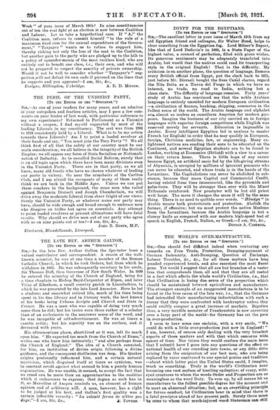THE LATE REV. ARTHUR- GALTON..
[To THE EDITOR 07 THE " SPECTATOR.] SIR,—In the late Rev. Arthur Galton the Spectator loses a valued contributor and correspondent. A cousin of the well- known scientist, he was at one time a member of the Roman Catholic Church, in which he took Orders, but from which he withdrew in 1885. lie, was subsequently secretary to his uncle, Sir Thomas Duff, then Governor of New South Wales. In 1899 he entered the ministry of the Church of England, being for a time chaplain to Bishop Boyd-Carpenter at Ripon, and later Vi6ar of Edenham, a small country parish in Lincolnshire, to which he was presented• by the late Lord Ancaster. Here he led a studious and somewhat retired life, much of his time being spent in his fine library and in literary work, the best known of his books being Urbana Scripts and Church and State in France. He was a man who was capable of doing very much more than he did; but his tastes were those rather of a scholar than of an ecclesiastic in the narrower sense of the word, and he was incapable of self-advertisement. He was at times a caustic critic; but his asperity was on. the surface, and it decreased with years.
His ultramontane phase, short-lived as it was, left its mark upon him. " He expected too much from the Church of Rome,". writes one who knew him intimately; " and also perhaps from the Church of England." The idea of a Church connoted, for him, an institution of divine origin following a divine guidance, and the consequent disillusion was deep. His Quaker
origins profoundly influenced him, and a certain natural mysticism, which disguised itself at times as cynicism, was in constant revolt against what seemed to him a purely human organization. He was unable, it seemed, to-accept the fact that
no creed can be more than an approximation to the realities which it endeavours to express; that dogma as such has in it, as Marceline of Ancyra reminds us, an element of human opinion and of arbitrary will. A man, however, has a right to be judged at his best, and Galton's first quality was a certain inflexible veracity; "La volontd ferule de Ware pas


































 Previous page
Previous page